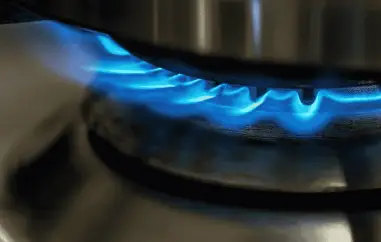Gas surcharge will be 2.4 cents
 The exact amount of the gas levy to rescue systemically important gas importers is now known: It will be 2.419 cents per kilowatt hour. This was announced by Trading Hub Europe GmbH, which is responsible for the publication, on Monday. The joint venture of the German gas transmission system operators, based in Ratingen in North Rhine-Westphalia, is responsible for the compensation payments to the importers. THE will then pass the payments on to gas suppliers, who will in turn pass them on to all gas customers.
The exact amount of the gas levy to rescue systemically important gas importers is now known: It will be 2.419 cents per kilowatt hour. This was announced by Trading Hub Europe GmbH, which is responsible for the publication, on Monday. The joint venture of the German gas transmission system operators, based in Ratingen in North Rhine-Westphalia, is responsible for the compensation payments to the importers. THE will then pass the payments on to gas suppliers, who will in turn pass them on to all gas customers.
The Economics Ministry most recently assumed a range of 1.5 to 5 cents per kilowatt hour, which would mean significant additional costs for customers. Economics Minister Robert Habeck (Greens) had said he expected "several hundred euros per household" per year. For a household with a single-family home and an annual consumption of 20,000 kilowatt hours, the additional costs would therefore be around 484 euros a year. Added to this is the value-added tax. However, the German government wants to prevent this from becoming due: Finance Minister Christian Lindner (FDP) has asked for an exception at EU level so that Germany does not have to charge VAT on the planned state gas levy. Chancellor Olaf Scholz (SPD) had assured citizens of additional relief in view of the sharp rise in energy prices. No one would be left alone.
The gas levy will apply from October, but it will not be immediately visible on bills, but with some delay, the ministry said. For consumer protection reasons, there are announcement periods in the Energy Industry Act of four to six weeks that must be adhered to, it said. Therefore, the levy will probably first appear on the bills in November/December.
The Ministry of Economics sees the levy as a consequence of the Russian war of aggression in Ukraine. This has drastically exacerbated the already tense situation on the energy markets. Since mid-June, Russia has reduced its gas imports to Germany in an unpredictable manner, thus creating an artificial energy shortage and driving up prices. This "external shock" is particularly affecting Germany, which has so far been heavily dependent on cheap gas from Russia. Many gas supplies from Russia, which had previously been contractually guaranteed, would cease.
The levy is intended to help importers who are suffering from the reduction in gas supplies from Russia. Gas importers have delivery obligations to their customers, especially to municipal utilities. Importers can only meet these supply obligations by replacing the lost volumes from Russia by buying significantly more expensive volumes on the short-term market. So far, these additional costs cannot be passed on. As a result, importers have incurred substantial losses. That's why the federal government has agreed a rescue package worth billions with the utility Uniper - and in the course of this also the gas levy. This is in addition to market-related price increases, which are gradually being passed on to customers.
Image by Steve Buissinne









































